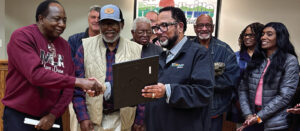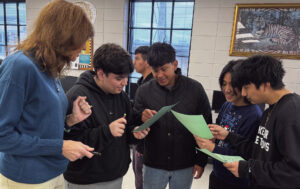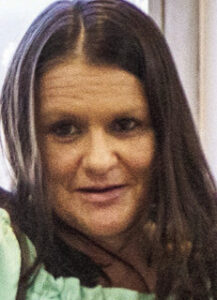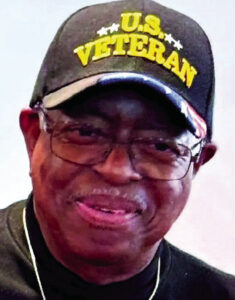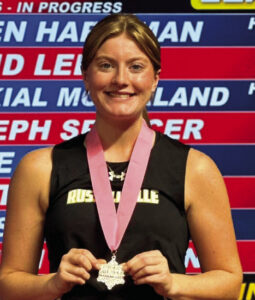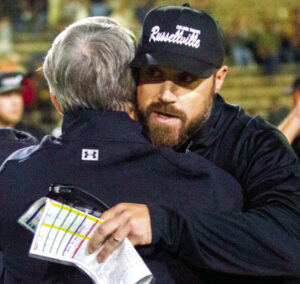Career tech leaders gather together
It’s a sweltering mid-July day in Alabama.
It’s only 8 a.m. but your clothes are already soaked, your hair is sticking to your face, and the humidity level couldn’t possibly get any higher.
You are trying to discover how you can make it through the day in the coolest way possible when the unthinkable happens: you realize your air-conditioner isn’t working.
You try everything to get it working, but the attempt has only left you hotter and sweatier than you were before.
Nearly suffocating from the stuffy heat that has now enveloped your entire house, you grab the telephone book and flip to the yellow pages where you find the number for your new best friend – the air conditioner repairman.
When someone is in a dire situation like this one, it is easy to see the value in service-related jobs like air conditioner repairmen, plumbers, electricians or mechanics.
But oftentimes, these people are overlooked when it comes to the list of revered professions and careers that are available to many of today’s youth.
However, on Thursday, secondary career technical teachers and supporters from a four-county area gathered at First Metro Bank in Muscle Shoals to speak with local senators and representatives about the importance of career technical programs and the value those careers have on society.
Several representatives from Franklin County were present including Community Education Coordinator Dr. Susan Hargett, who works to secure grants for many areas of education, including career technical grants.
Hargett also served as the counselor at the Franklin County Career Technical Center in Belgreen for many years, so she understands the value of these types of classes.
“Everybody needs to learn how to work or how to have a skill,” Hargett said. “No matter what career someone ends up having, those skills will be important in their everyday life.”
Hargett said she was amazed when a group of carpenters came to do repairs at her home because they were using high-level math skills to make their measurements.
“Career tech courses teach students to think ahead, plan and use their minds,” Hargett said. “It really takes a smart person to be trained in a career tech field, and so many people just don’t realize that.”
Hargett said the problem with the method of teaching today is that everyone forgets about the career tech fields and instead lumps students into one of two courses of study.
“Students are either taking advanced placement courses or they’re taking remedial courses,” she said. “Because of this, we are losing many bright and creative minds because they don’t feel like they have a purpose in school. But if these students were offered hands-on learning with career technical courses, they would see that there is value in what they do. They would have a purpose.
“Going to college is a good choice for some people, but students are all different,” she added. “We can’t try to fit them all into the same round hole.
“Service job are important and always in demand, and those jobs can’t be outsourced to other countries. People are always going someone to fix their sink, fix their car, and build buildings.”
Event organizer Gary Dan Williams, who is the career tech director for the Muscle Shoals City Schools Center for Technology, said somewhere down the road, the phrase “vocational career” became a bad thing, but that is just not the case.
“There is a gap between our students entering high school and the workforce that students are slipping through because they do not realize that there is a future out there for them,” Williams said. “Secondary career tech education is the key to bridging that gap.
“Career tech students who take at least two cooperative career tech classes will have a 94 percent chance of graduating because we showed them there is hope.”
Two students from Tharptown High School and three students from Red Bay High School who are all currently involved in career tech classes at the Franklin County Career Technical Center attended the event on Tuesday because they have seen the importance of career tech courses first-hand.
“Career tech classes can help students who do plan to go on to college as well,” FCCTC health sciences teacher Kay Hargett said. “The classes are set up to be beneficial to students who will immediately enter the workforce after high school or students who plan to attend either a two- or four-year college.”
THS seniors Linda Castillo and Izzy Garcia are both involved in health science classes through the FCCTC. They have been involved in the Health Occupation Students of America (HOSA) organization for two years and value the opportunity they’ve been given through career tech classes.
“I was already interested in nursing, so I knew being involved in HOSA would help me be better prepared for my career,” Castillo said. “I’ve learned things about body structures, diseases and other medical issues I wouldn’t have known about if this class wasn’t available.”
“I want to be a nurse practitioner someday, so I knew health science classes would help me,” Garcia said. “Through HOSA, I’ve been to state leadership conventions and I have also learned emergency response training that could even be helpful now if someone near me was in that type of a situation.”
RBHS eleventh graders Lauren Gray and Jessica Fowler are officers in the Red Bay chapter of the National FFA Organization – a decision they first based on their respect for FCCTC director Herbert Trulove.
“Mr. Trulove is a great teacher, so we knew we’d like the organization because of him,” Gray said. “But we also learn so many things about leadership and the community, so it’s really a great organization to be a part of.”
“We learn so many practical things in FFA that can help you in many different situations,” Fowler added. “You don’t get that kind of experience just sitting in a classroom learning radical functions.”
Fowler said they have also discovered their “green thumbs” by planting things like tomatoes and peppers.
“Career tech classes are just important, and the things you learn there will help you in the real world,” Gray said.
Rep. Johnny Mack Morrow attended the event to show support for career tech programs that he said “hit close to home.”
“My father was a vocational and FFA teacher at Vina High School when I was born, and he taught children how to build and make things,” Morrow said. “I grew up in the ag shop and saw these kids learning skills that our young people lack the knowledge of today.
“It’s popular now to want to go to college, but education for some people terminates after high school, and sometimes even before then.
“These kids need to know that having a marketable skill is an important thing to have, and there are many lucrative opportunities in career tech fields. Having a small business or a trade is success.
“I am a strong advocate for these programs and I believe it is important to make sure they are adequately funded because the children in these programs will grow up to be contributing members of society.”


